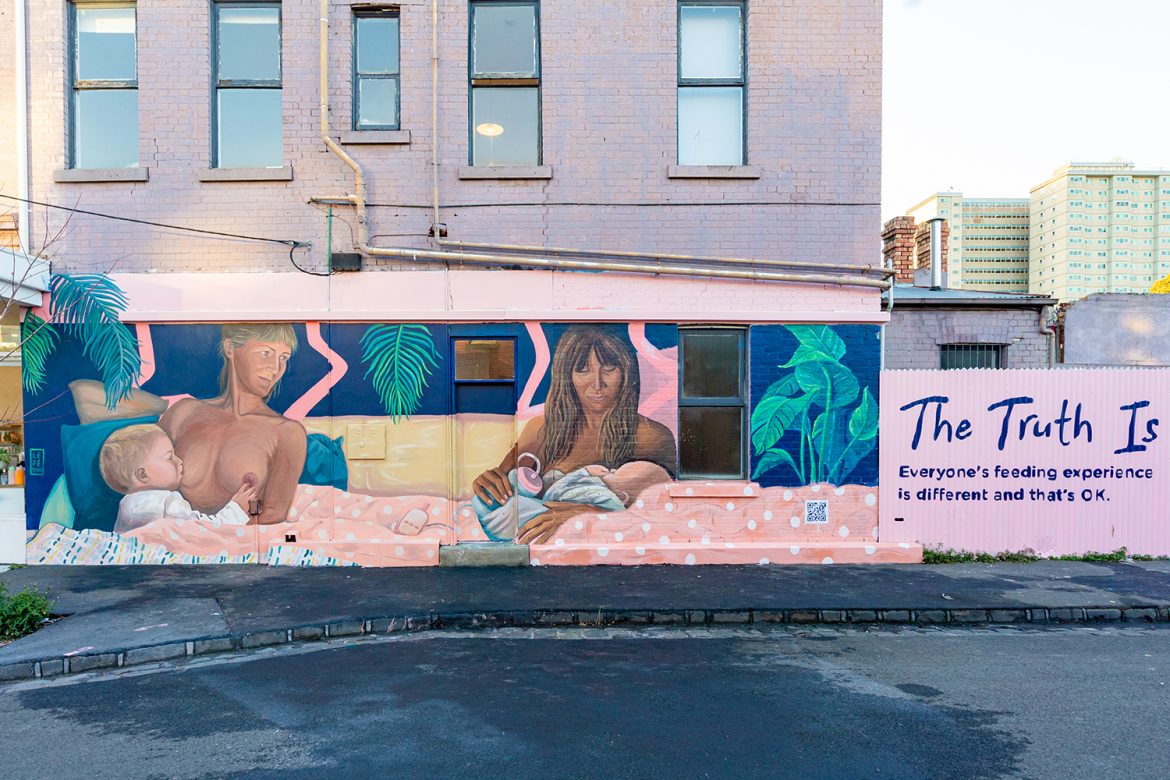The first week of August marks World Breastfeeding Week, an ode to something that’s been around for as long as we’ve existed!
In the modern day and age, we would think that with all the technology-led sharing of stories and struggles, especially for women, people would know a lot more about breastfeeding and challenge its misconceptions. Strides have certainly been made in the world. A few years ago, Australian parliament Senator Larissa Waters breastfed her daughter during a vote in 2017, making headlines. Her act inspired numerous other women to feel more encouraged to breastfeed not just in public, but in places like the office.
This week, a larger-than-life mural also went up in Melbourne – the work of artist Caroline Lejeune, entitled‘Breastralia’ aimed at celebrating the joy of being a new mom.

Unfortunately, despite its natural essence and the health benefits for both mom and baby, many taboos still exist.
Breastfeeding in South Africa sees an incredibly low exclusive breastfeeding rate on the African continent. Prof Lisanne du Plessis shared with 702 that “to influence individual behaviours and attitudes our messages around breastfeeding need to change.”
In striving to remove the stigma around breastfeeding, Philips Avent decided to conduct a survey.
Philips Avent draws almost 30 years of clinical experience in baby feeding to offer the solution that best meets parents’ needs. This year, the company took to ask 6453 women across 25 countries globally about how breastfeeding is currently experienced in the world through their eyes.
The survey came from the company’s belief that mothers should be able to make their own breastfeeding decisions – anytime, anywhere, and that they should be able to breastfeed where and when they need to. So, how close are we to reaching these goals?
Here’s what the survey found:
Breastfeeding in public – is still not considered ‘normal’
The results show there’s still work to be done to support and empower moms in their choice to breastfeed in public. Around two-thirds (66%) of moms globally say they would feel more confident and comfortable breastfeeding in public if it was considered ‘normal’. Feeling embarrassed or uncomfortable breastfeeding around people they don’t know, is the key reason (52%) of women feel too hesitant to consider breastfeeding in public. The results also reveal many moms (40%) would not consider pumping in public, rising to 69% in France and dropping to 17% in the USA.
The results vary across cultures and countries and breastfeeding and expressing in public is not something every mom wishes to do. At Philips, we recognise every breastfeeding journey is unique and personal to parents and babies; there is no right or wrong way. Parents may choose to feed their baby directly from mom’s breast, with expressed milk, or both, or between formula bottles. Some may choose to feed in public or in the comfort of their own home. Whatever their choice, Philips wants to empower and support all parents with solutions that support each of these choices.
Moms should feel they have the ‘right’
The results go on to reveal that while the biggest motivator for moms globally to breastfeed in public is being able to feed their babies as soon as they need it (59%), almost half (47%) globally say having the ‘right’ to breastfeed in public would also motivate them to do so, rising to 57% in Austria and Canada and dropping to 31% in South-Africa.
Only through greater breastfeeding awareness, encouraging breastfeeding policy change, and creating more supportive communities around moms that empower them to feed their way, will more people start to recognise and promote breastfeeding as the basic human right it actually is.
Moms deserve greater support
Added to this, many moms say greater overall support from others would help them feel more comfortable breastfeeding in public, with this being true for almost a third of moms in the USA (33%), Spain and Mexico (both 30%). Meanwhile, greater partner support would help for many in Colombia (41%), Mexico and Chile (both 40%), compared to fewer in Austria (17%) and Germany (13%). These figures go a long way to indicate many moms would love to see society’s overall understanding and perception of breastfeeding shift from something inappropriate or unnecessary to one of the most natural, fundamental acts of care in the world. This shift can only happen by educating more people on the value of breastfeeding, starting more conversations about it and championing parents’ choices to feed however best suits them – something that lies in all of our hands.
BreastStories: supporting and empowering parents
Philips Avent shares that there’s “great power in talking about your experiences with healthcare professionals, lactation consultants, at antenatal classes, via apps and online communities, and with family, friends, and other moms.”
Through its online platform, BreastStories, parents from around the world can share their breastfeeding stories, tips, and tricks via Instagram and Facebook, as well as find breastfeeding information and advice from healthcare professionals.
To join the community and keep up, you can download the Philips Pregnancy + or Baby+ app. Parents can also log feeding information, as well as track their baby’s development, such as their weight, height, and head circumference during the first year. Breastfeeding can be wonderful but it’s not always straightforward or easy for moms. Feeling comfortable is key to a positive breastfeeding experience as it makes it easier to release milk.
Further key global research statistics:
• 36% of women would feel more confident and comfortable breastfeeding in public if they saw other women around them doing so.
• About 1 in 4 expecting mothers feel expressing in public is a hassle.
• 30% of women would like to be able to express while travelling, working, doing the laundry/chores around the house, taking care of other children, during dinner with friends/family in a restaurant or while visiting friends and family.
ALSO SEE:
Blurred vision during pregnancy? Here’s what to look out for
FEATURE IMAGE: Art by Caroline Lejeune

